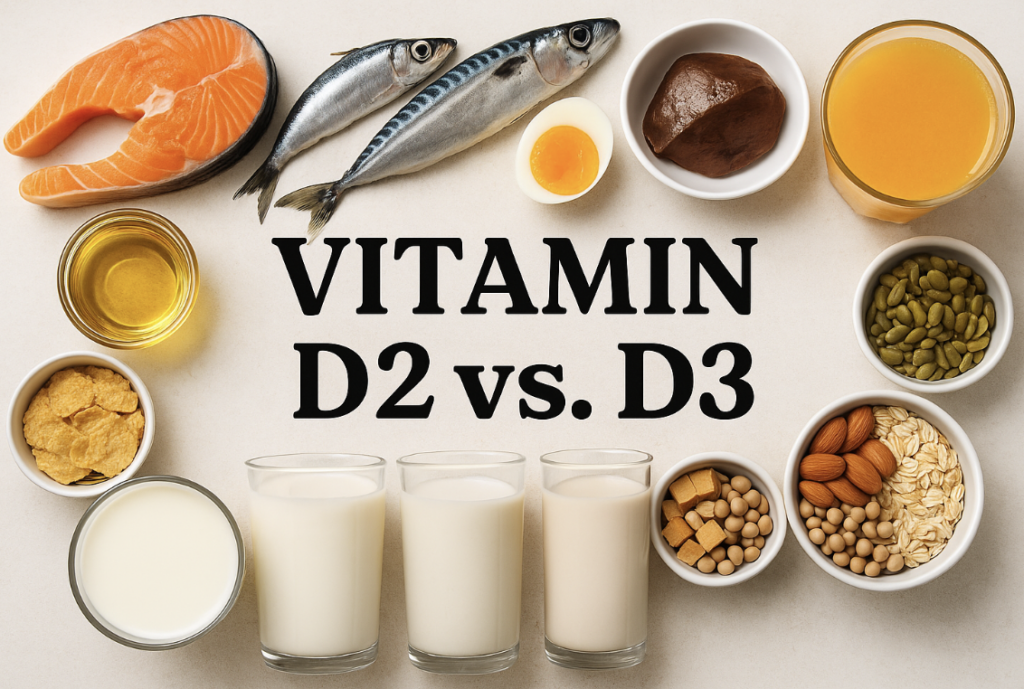Vitamin D is a fat-soluble nutrient crucial for strong bones, immune function, and mood regulation. But not all vitamin D is the same. There are two main forms—vitamin D2 (ergocalciferol) and vitamin D3 (cholecalciferol)—and they differ in important ways. In this post, you’ll discover the differences between vitamin D2 and D3, their health benefits, best sources, and which form may be better for your health.
What Is Vitamin D and Why Is It Important?
Vitamin D helps the body absorb calcium and phosphorus, regulates immune function, and supports mental health.
✔ Key Functions of Vitamin D:
- Supports calcium absorption and bone strength
- Enhances immune response
- Regulates mood and reduces risk of depression
- May help lower risk of chronic diseases (e.g., heart disease, diabetes)
💡 Did You Know? Your skin can produce vitamin D3 when exposed to sunlight, but modern indoor lifestyles often limit this natural source.
Vitamin D2 vs. D3: What Are the Differences?
✔ Vitamin D2 (Ergocalciferol):
- Derived from plant sources like mushrooms exposed to UV light
- Found in some fortified foods and supplements
- Less effective at raising and maintaining blood levels of vitamin D
✔ Vitamin D3 (Cholecalciferol):
- Derived from animal sources (like fish oil, egg yolks) or lichen (for vegan D3)
- Naturally produced in human skin after sunlight exposure
- More effective and longer-lasting at raising vitamin D levels
💡 Summary: Vitamin D3 is generally superior for maintaining optimal blood levels.
Health Benefits of Vitamin D (Both D2 and D3)

✔ 1. Strengthens Bones and Prevents Osteoporosis
Vitamin D helps your body absorb calcium efficiently, critical for bone density.
✔ 2. Boosts Immunity
Supports production of antimicrobial proteins and enhances defense against viruses and bacteria.
✔ 3. Improves Mood and Reduces Depression Risk
Low vitamin D levels are linked to seasonal affective disorder (SAD) and other mood disorders.
✔ 4. Supports Heart Health
Vitamin D deficiency has been associated with higher blood pressure and heart disease risk.
✔ 5. May Aid Weight Management
Some studies suggest vitamin D can help regulate appetite and body composition.
Signs of Vitamin D Deficiency

⚠️ Common Symptoms:
- Fatigue and tiredness
- Bone pain or muscle weakness
- Frequent infections
- Low mood or depression
- Hair thinning or loss
💡 High-Risk Groups:
- People with little sun exposure
- Older adults (skin makes less vitamin D)
- Darker-skinned individuals (less vitamin D production from sun)
- Those with fat-malabsorption issues
Best Food Sources of Vitamin D

🐟 Natural Sources:
- Fatty fish (salmon, mackerel, sardines)
- Cod liver oil
- Egg yolks
- Beef liver
🌾 Fortified Foods:
- Milk, plant-based milks (almond, soy, oat)
- Breakfast cereals
- Orange juice
💡 Tip: Mushrooms exposed to UV light are a good plant-based source of D2.
Supplementing Vitamin D: What to Know
💊 Forms Available:
- Vitamin D2 supplements (usually cheaper, plant-based)
- Vitamin D3 supplements (animal-based or vegan options available)
⚠️ Choosing the Right One:
- D3 is usually preferred for maintaining blood levels
- D2 can still be effective for short-term supplementation
- Always check for dosage, especially in high-potency supplements
💡 Tip: Vitamin D is fat-soluble—take supplements with a meal that contains healthy fats for better absorption.
Pros and Cons of Vitamin D2 and D3
✔ Pros of D2:
- Plant-based and vegan-friendly
- Can raise vitamin D levels temporarily
✔ Pros of D3:
- More effective and longer-lasting
- Better absorbed and utilized by the body
⚠️ Cons:
- D2 is less stable and may degrade faster
- High doses of either form can lead to toxicity (hypercalcemia)
Both vitamin D2 and D3 can help prevent deficiency, but D3 is generally the more effective and reliable option for raising and maintaining healthy blood levels. Focus on regular sun exposure, nutrient-dense foods, and D3 supplementation if needed—especially during winter months or if you’re at higher risk for deficiency.
Read more on vitamin C for immunity and skin health
Learn more about vitamin D from the National Institutes of Health
